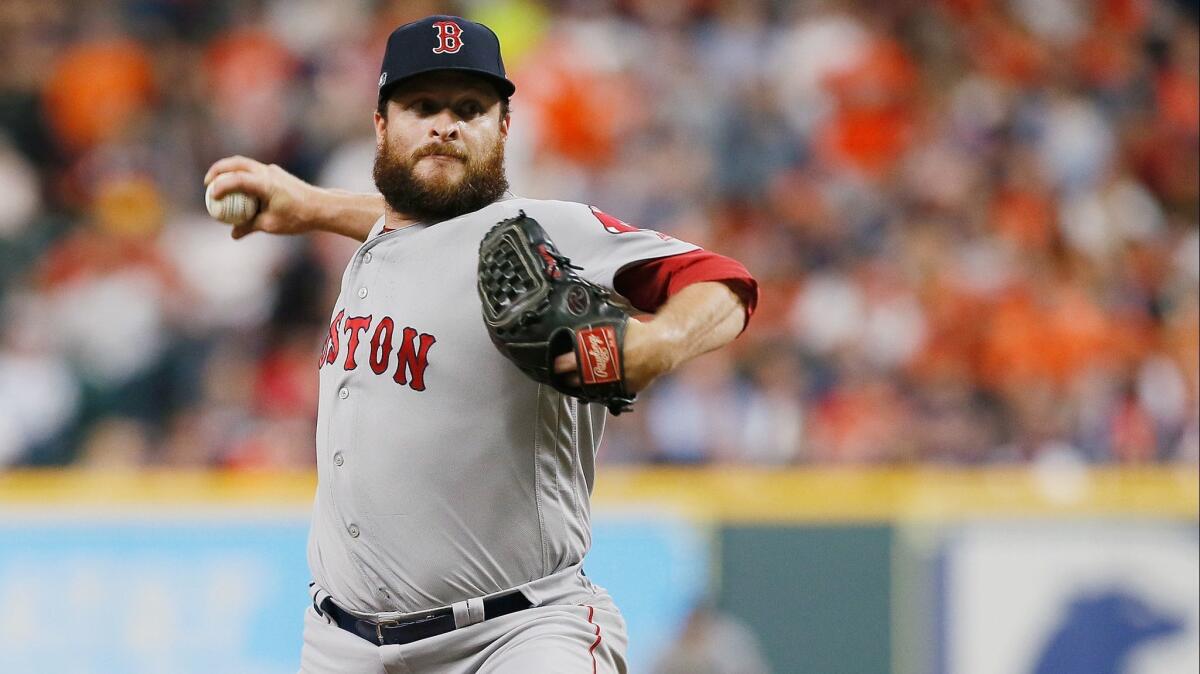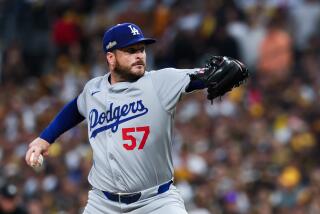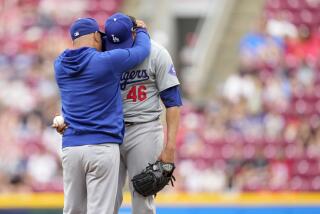‘He’s a no-name’: How Ryan Brasier went from the Angels to Japan to a key member of Boston’s bullpen

- Share via
Reporting from Boston — The phone call came on a late February afternoon in a small-town Texas shopping center, days after his wife had posed a simple question: “What’s next?”
Baseball had led Ryan Brasier, a long-ago sixth-round draft pick of the Angels, on a meandering journey. He’d traveled several thousand miles, flown across the Pacific Ocean twice, staged a showcase for major-league teams in Arizona — and still came up empty.
Brasier was 30 years old. He had only accrued 41 days of major-league service time. The end had to be near.
But as he wandered jobless in that Wichita Falls, Texas, mall, Brasier declined to move on from baseball. He’d boasted a mid-90s fastball since becoming a pitcher in junior college in 2007, and the pitch had only become more devastating the previous two seasons.
Someone had to notice.
“I was gonna sit on my thumb until somebody called,” Brasier said.
During a shopping trip for his youngest child’s third birthday, someone finally did. The Boston Red Sox rang Brasier’s cellphone and beckoned him to Fort Myers, Fla., with the promise of a minor-league contract.
“Hey, change of plans,” Brasier told his wife, Shaina, after hanging up. “I’m leaving tomorrow.”
Seven months have passed. Once waylaid by snags in the road, Brasier’s return trip to the major leagues has smoothed out. Now it includes a run-in with a Yankees player during the playoffs, a perfect ERA in the postseason and an opportunity to pitch in the World Series as a 31-year-old rookie.
“It’s been crazy,” Brasier said during the team’s media session Monday at Fenway Park. “I mean, I know I keep saying that but I never would have thought I would be sitting here, talking to you guys before the World Series, in January.”
A year ago, Brasier was preparing to return home from a season spent playing in Japan for the Hiroshima Carp. He had not pitched as often as he wanted after arriving in January 2017. He spent much of his time shuttling to and from the team’s minor-league affiliate and pitched only 26 times for Hiroshima.
But the experience in Japan helped Brasier with at least one thing. As he compiled a 3.00 ERA, he stopped falling behind hitters as often as he had in 2016. He walked eight and struck out 19 over 30 innings. The numbers weren’t staggering, but they marked an improvement over a walk rate that had often been a point of contention during his time with the Angels, who drafted him out of Weatherford College in 2007 and promoted him to their 25-man roster in 2013.
“I don’t know if it was a mechanics thing as much as it was learning how to pitch,” said Brasier, who was a catcher through high school. “My first five or six years it was all, ‘I’m just gonna try to blow the ball by you.’ And you know, guys can hit fastballs. So I had to learn a little movement on my fastball and try to locate to both sides of the plate.”
Brasier found some success. But when he returned to the United States with newfound command of his repertoire, which includes a slider that drew 45.3% whiffs this year, no one reached out.
So Brasier took control. He emailed teams, called members of front offices and informed everyone he was ready for a second chance. He set up in Arizona for two weeks in January, got in shape and threw bullpens for evaluators.
Spring training began mid-February and still nothing.
“That was something in 12 years of playing baseball that had never happened,” Shaina Brasier said.
At his peak, Brasier had been ranked the Angels’ 11th-best prospect by Baseball America after making his major-league debut in 2013.
Even after undergoing ulnar collateral ligament surgery in 2014 to repair damage in his right elbow, a procedure that effectively ended his seven-year tenure in the Angels organization, Brasier encountered little trouble finding a place with another club. He’d displayed the ability to become a viable middle-innings relief pitcher in brief major-league stints with the 2013 Angels.
The Oakland Athletics signed Brasier to a minor-league contract and oversaw his rehab from Tommy John surgery in 2015. They invited him to spring training the following season. Healthy, Brasier posted a 3.56 ERA in 60 2/3 innings for Oakland’s triple-A affiliate and struck out 70 batters — the most since he struck out 94, while also issuing 68 walks, for the Angels’ double-A club in 2010.
Brasier had been invited to major-league spring training for 2017 when the Athletics called him about pitching in Japan. The opportunity to make more money abroad than he would in the minor leagues made the decision easy.
But Brasier’s jaunt in Japan, the end of which coincided with last winter’s cratered free-agent market, had nearly wiped him from the map.
The showcase in Arizona paid off a month later, when the Red Sox sought to improve their pitching depth with a bargain.
Brasier hardly spent time in spring training around the players who became his teammates upon his promotion in July. He’d been assigned to minor-league camp and was most often part of major-league split squads. But Brasier made an impact anyway, often closing out Grapefruit League games for manager Alex Cora and lighting up the radar gun with a high-90s heater.
“He kept catching people’s eyes,” president of baseball operations Dave Dombrowski said.
Brasier earned a roster spot for Boston’s triple-A affiliate. His progress during the spring didn’t tail off. By the time he earned his first major-league promotion in nearly five years, Brasier had an 1.34 ERA and allowed just one unearned run in his last 20 triple-A outings.
“I don’t wanna say that I, to myself, had to prove something…,” Brasier said. “I think I had something to prove to the teams that didn’t want to give me a chance.”
Mission accomplished.
Brasier never went back to triple-A. Called up July 8 when the Red Sox bullpen became short-handed before the All-Star break, Brasier handled his first month back in the big leagues by holding opponents to a .147 batting average and giving up just one earned run.
Instead of making a trade for a high-profile reliever, the Red Sox began to trust Brasier in high-stress situations. Brasier responded at the same level. Although he allowed 44% of the 18 runners he inherited to score, Brasier only yielded 19 hits and seven walks while striking out 29 in 34 major-league games this year.
“Brasier has always been good but he’s a no-name,” Dombrowski said. “Nobody knew about him.”
Brasier became even more effective during the playoffs. In seven appearances, he’s surrendered just four hits. Two of those came in Game 1 of the American League Division Series, when he lasted one-third of an inning in relief of Red Sox ace Chris Sale and allowed two of Sale’s baserunners to score.
Since, Brasier’s potent fastball, off which batters slugged just .175 in the regular season, has helped him to record nearly perfect outings. He hasn’t allowed a run of his own in seven frames.
“He’s been incredible,” said fellow reliever Matt Barnes. “He’s been a huge part of our bullpen for the last few months. His ability to come in situations, doesn’t matter the score, the runners, the batter, anything like that. He’s been phenomenal. … His composure is incredible.”
Brasier’s composure made him social-media famous earlier this month. An argument with the Yankees’ Gary Sanchez during Game 2 of the ALDS — Brasier barked at Sanchez to “Get in the … box” after Sanchez stalled his at-bat in a 1-2 count, then struck Sanchez out with a 97 mph fastball on the next pitch — helped catapult Brasier into the public’s eye.
With the World Series against the Dodgers looming, Brasier now finds himself on the brink of losing the anonymity, perhaps for good.
“I don’t know if you know the story about when he came [up for his debut],” Cora said in his news conference Monday. “It was a 4-0 game in the ninth and I got [Rick] Porcello, Sale and David [Price] in the dugout. And I went to them and said, ‘I know you guys don’t know who he is … but this guy is good. They’re looking at me, like, ‘OK, right.’ First pitch is 98 and they were going nuts in the dugout. It was cool to see.
“We’re very proud of him. It’s one of those stories that we should talk about it.”
More to Read
Are you a true-blue fan?
Get our Dodgers Dugout newsletter for insights, news and much more.
You may occasionally receive promotional content from the Los Angeles Times.







